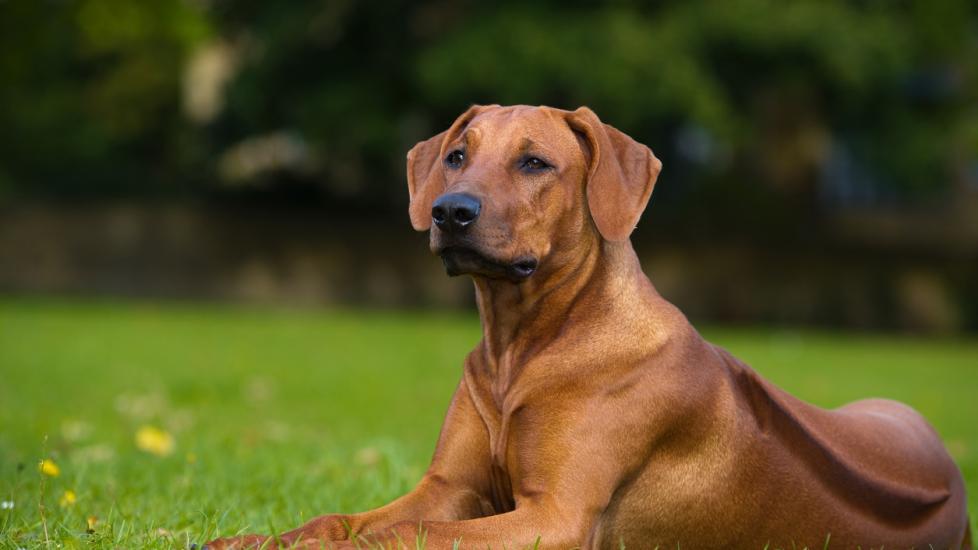Rhodesian Ridgeback
iStock/tkatsai
The Rhodesian Ridgeback is a gentle and intelligent dog that can make a terrific family pet for the right household. The dogs are named after the ridge of hair that grows down the center of their back—in the opposite direction from the rest of their coat, according to the breed standard.
The Rhodesian Ridgeback size reaches 70–85 pounds and stand 24–27 inches high at the shoulder. They are muscular, powerful, and athletic. Also known as African Lion Hounds, Rhodesian Ridgebacks were bred as hunting dogs that could flush out and track large predators, including lions.
Occasionally, Rhodesian Ridgebacks are born without the gene for the backward-growing hair; these dogs are referred to as “Ridgeless Ridgebacks.” But they still have the other traits innate to the breed, just without the defining ridge.
Caring for Rhodesian Ridgebacks
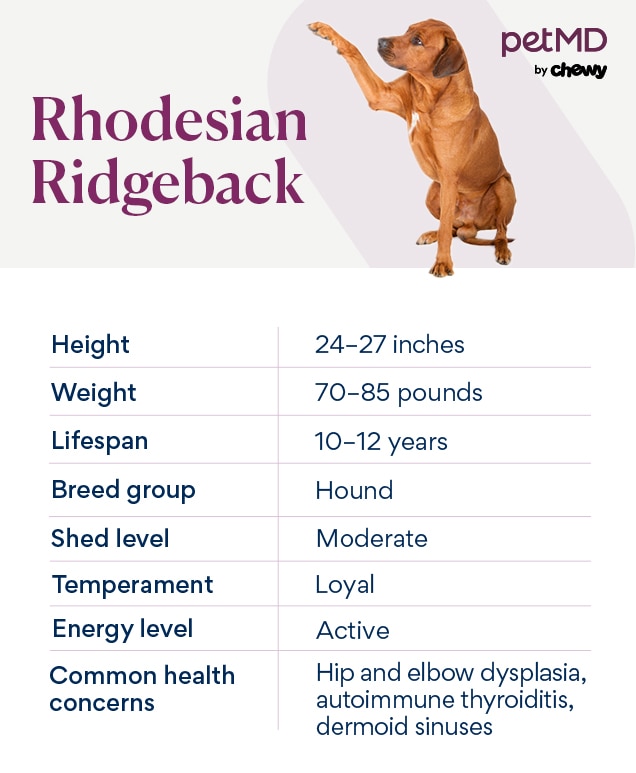
As hound dogs, Rhodesian Ridgebacks are great athletes with stamina and endurance. They require regular exercise—at least 45 minutes a day. Ridgebacks also need daily enrichment and mental stimulation to keep them from getting bored.
They are known for their strong affection toward their human family, and when Ridgebacks are socialized and trained with positive reinforcement, they are good with children. But when it comes to unfamiliar people, the Rhodesian Ridgeback’s temperament can be much more aloof.
Ridgebacks have short fur that comes in one color: wheaten. However, they can have varying shades of this color, from light brown to almost red. This breed has a strong, square head with a black or brown nose and floppy ears.
Rhodesian Ridgeback Health Issues
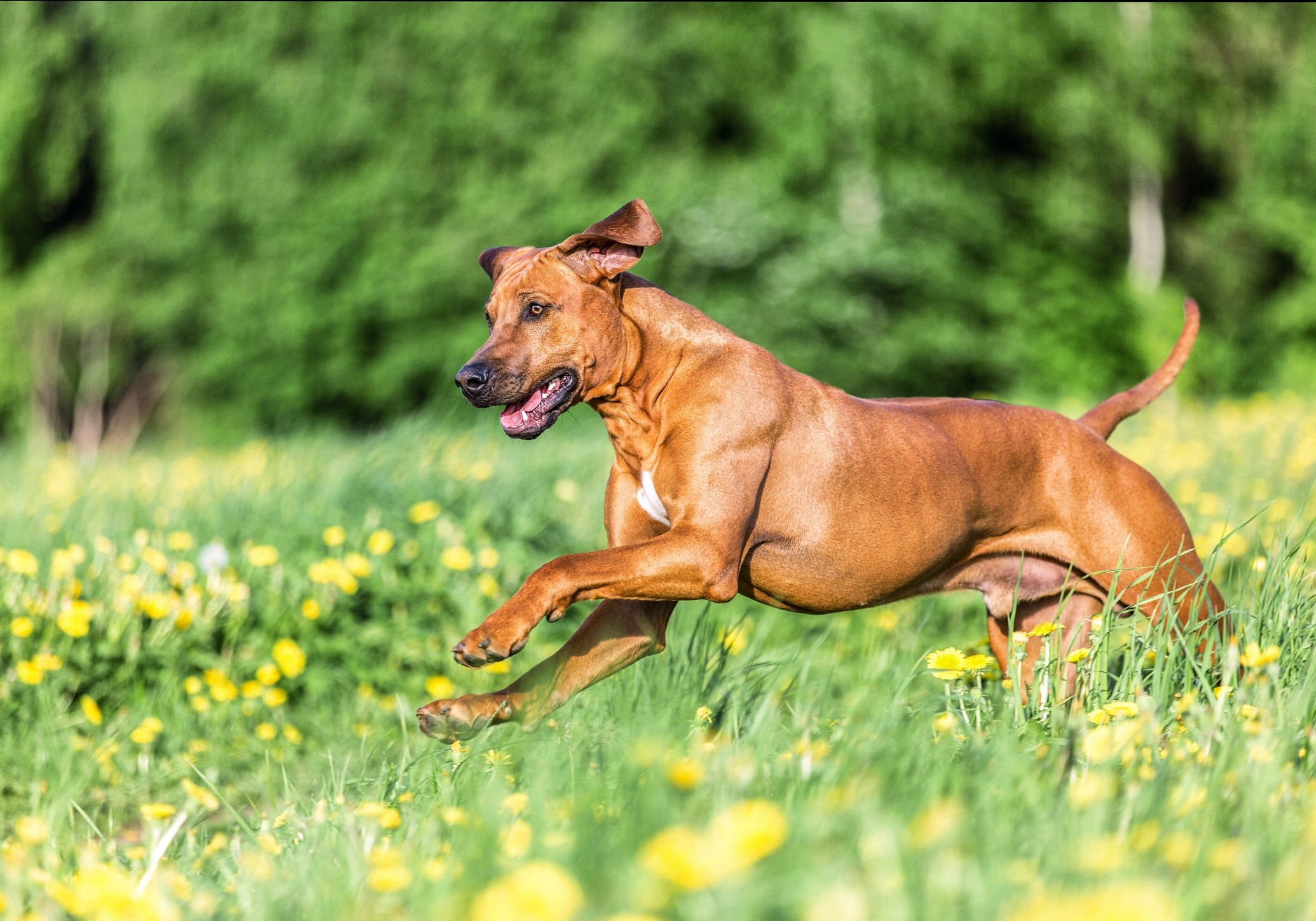
In general, the Rhodesian Ridgeback lifespan is 10–12 years. They are typically healthy dogs, but responsible breeders should still screen and monitor their dogs for certain health issues that are commonly seen.
It’s important to inquire about breed testing when looking to purchase a dog from a Rhodesian Ridgeback puppy breeder.
Hip and Elbow Dysplasia
Hip dysplasia and elbow dysplasia are both joint disorders commonly seen in large and giant dog breeds. Both are thought to be inherited conditions and can cause pain and arthritis in dogs.
Severe cases can show signs early in life, but dysplasia most often affects older dogs as the disease progresses. In young dogs with severe cases, surgery may be necessary.
In most older dogs, the conditions are managed with a combination of:
-
Alternative therapies such as laser treatment, physical therapy, and acupuncture
Autoimmune Thyroiditis
Autoimmune thyroiditis is a disease of the thyroid gland resulting in low thyroid values (hypothyroidism). These can lead to weight gain, lethargy, skin conditions, and more serious heart issues or seizures.
Veterinarians typically test Ridgebacks’ thyroid levels once a year, when their annual exam and blood work are performed.
Dermoid Sinuses
Dermoids are defects of the skin and nervous system that result in tubelike openings under the skin, which can be readily felt shortly after a Rhodesian Ridgeback puppy is born. Severe sinuses may reach as deep as the spinal canal. These sinuses can become infected and painful, causing secondary issues such as inflammation of the brain or spinal cord (encephalitis), which can be life-threatening.
Surgical removal is the treatment of choice. Reputable Rhodesian Ridgeback breeders typically have puppies tested and treated before they ever reach a new home, but dermoids may return if not completely removed.
Deafness
According to the Rhodesian Ridgeback Club of the United States (RRCUS), progressive deafness is not uncommon in the breed. Affected Rhodesian Ridgeback puppies will be born able to hear, then begin losing their hearing around 6 months of age.
Eye Problems
Rhodesian Ridgeback dogs can develop several health issues affecting their eyes, including:
-
Cataracts: the eye lens becomes cloudy and leads to vision loss
-
Entropion: where the eyelid rolls inward and rubs the eye, leading to irritation and ulcers
-
Distichiasis: abnormal eyelash growth that rubs against the eye and, like entropion, cause irritation and ulcers
-
Persistent pupillary membranes: fetal tissue remaining on the eye after birth
What To Feed a Rhodesian Ridgeback
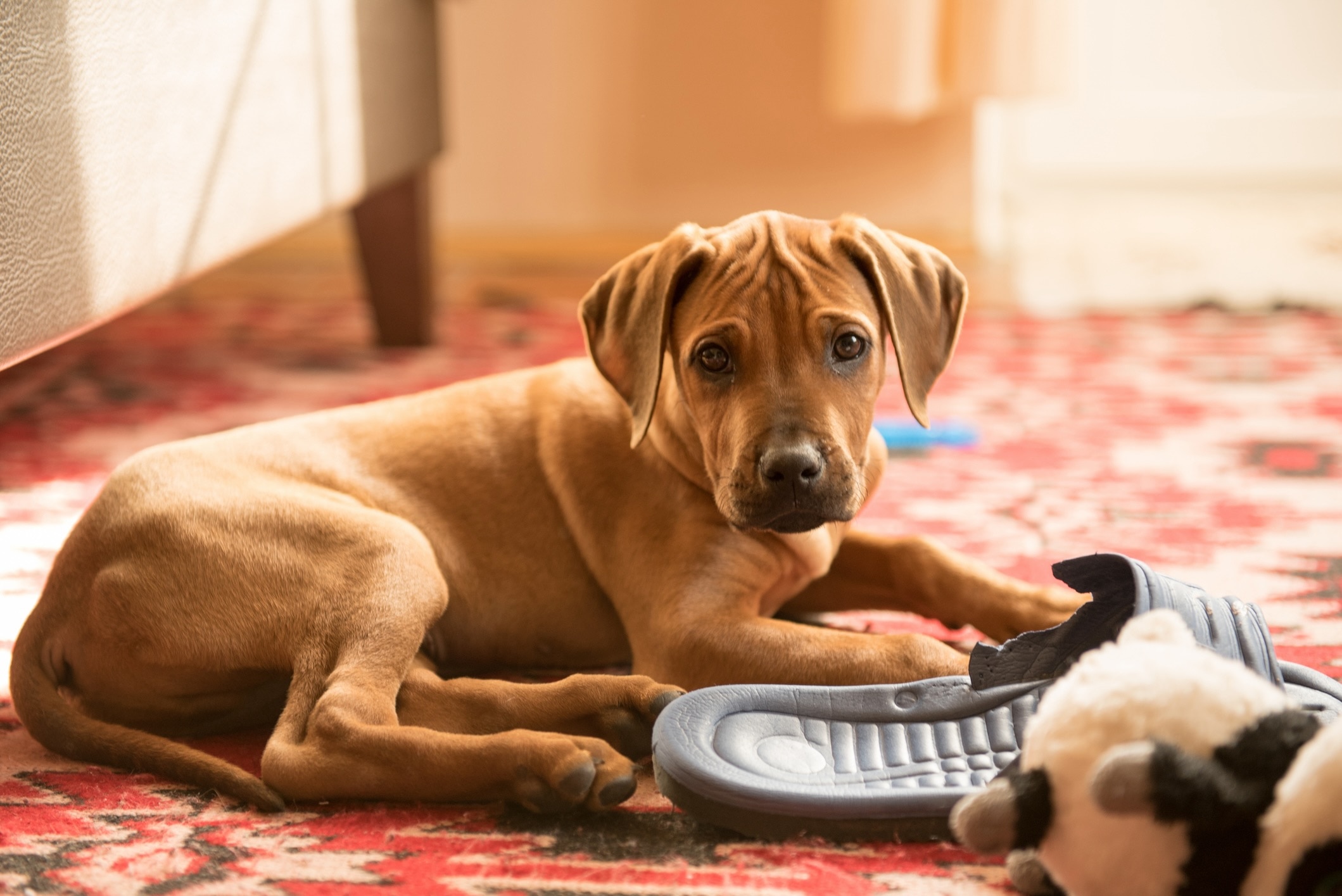
Providing proper nutrition is one of the most important things you can do to keep your Rhodesian Ridgeback happy and healthy. Most veterinarians recommend feeding Ridgebacks large-breed formulations from pet food companies that employ full-time board-certified veterinary nutritionists, such as Hill’s®, Purina® Pro Plan®, and Royal Canin®.
The Association of American Feed Control Officials (AAFCO) provides detailed information and recommendations regarding the safety and nutritional content of dog foods. Always make sure your Rhodesian Ridgeback’s food has the AAFCO seal of approval.
Depending on lifestyle and caloric needs, your Rhodesian Ridgeback may require a slightly more specific and tailored diet to maintain lean muscle mass. This strong, athletic breed may require higher protein levels, with nutrition optimized to fuel strength and stamina.
Rhodesian Ridgebacks with working jobs (hunters, agility dogs, and show dogs) may require this level of nutrition, as well as other active pets who enjoy frequent running, hiking, swimming, and play.
How To Feed a Rhodesian Ridgeback
Most veterinarians recommend feeding adult dogs, including Rhodesian Ridgebacks, twice a day—typically in the morning and again around dinnertime.
Know that Ridgebacks are smart dogs that can counter surf to steal human food off tables. Human food can lead to gastrointestinal upset, pancreatitis, toxicities, and obesity, so try to keep your Ridgeback from snacking on human food and stop your dog from counter-surfing.
Always feed dogs a diet that’s appropriate for their life stage. For example, puppies have very different nutritional requirements than senior dogs. Your vet can help you choose the right dog food for your Ridgeback. Rhodesian Ridgeback puppies need to eat a puppy food for large-breed dogs.
If your pet tends to swallow food without chewing, you may want to consider slow-feed bowls or other options that deliver a small portion at a time. Eating too fast can cause gastrointestinal upset as well as other serious medical issues such as bloat.
How Much Should You Feed a Rhodesian Ridgeback?
Talk to your veterinarian to determine the right amount to feed your Rhodesian Ridgeback dog, based on weight and body condition. Your vet will also consider your Ridgeback’s activity level, age, and pre-existing conditions when making a recommendation on caloric intake.
Nutritional Tips for Rhodesian Ridgebacks
Omega-3 fatty acids (fish oil) are a great supplement that can help keep your dog’s skin and coat soft, shiny, and healthy. These supplements also promote a strong heart, immune system, brain, and vision.
Supplements containing glucosamine, like Cosequin® or Dasuquin®, can help keep the joints of large-breed dogs healthy, which is vital to an active Rhodesian Ridgeback.
Talk to your veterinarian before starting any supplements to make sure they are appropriate for your pet.
Behavior and Training Tips for Rhodesian Ridgebacks
Rhodesian Ridgeback Personality and Temperament
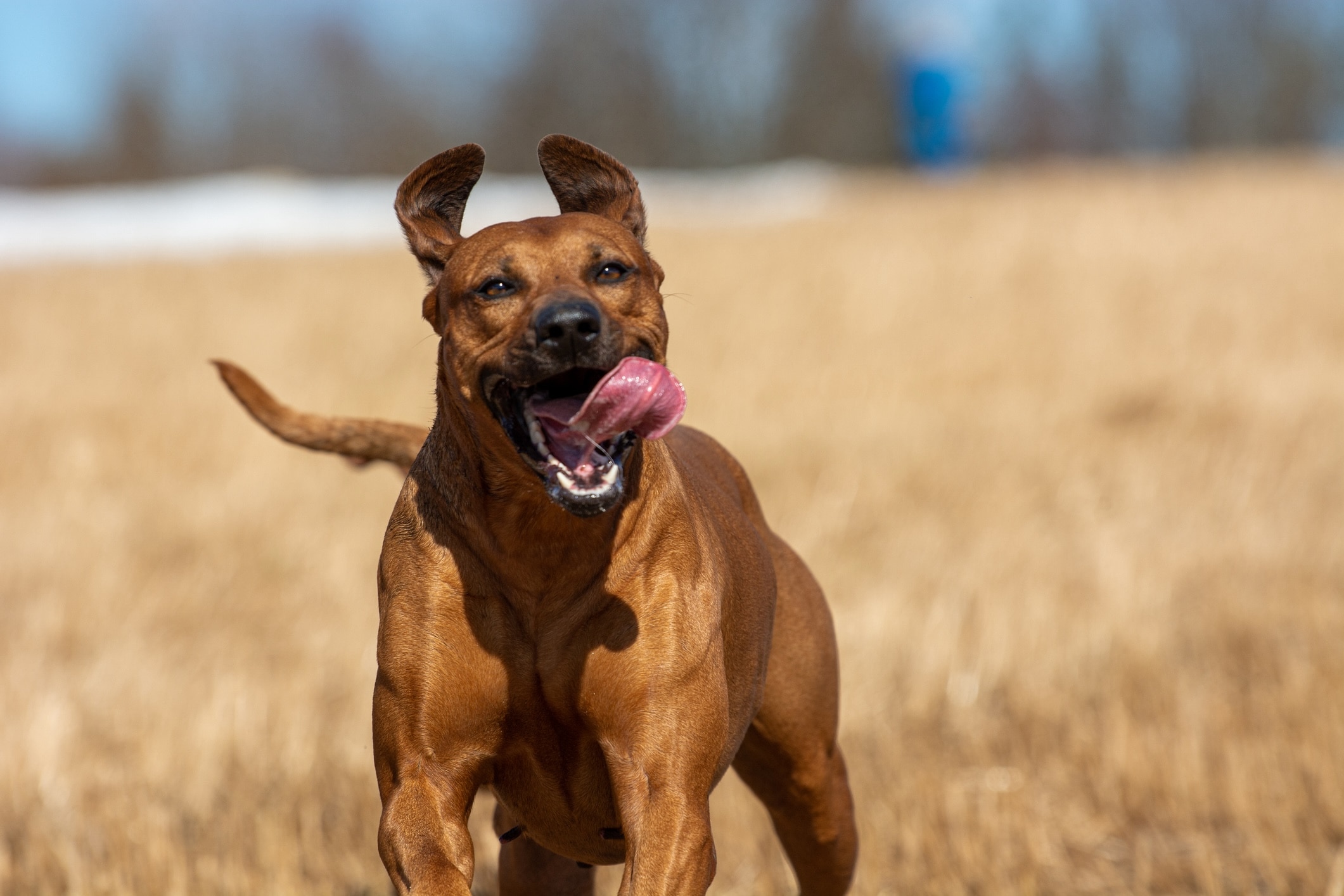
Though Rhodesian Ridgebacks were originally bred to work, they can make good family dogs and form strong bonds with their humans. But their guardian instincts means they can be aloof around strangers.
Another Rhodesian Ridgeback characteristic—their hunting history and prey drive—means they might not be the best choice for families with smaller pets like cats. But Ridgebacks can do well with other dogs, especially with patient introductions and if they are properly socialized when young.
Rhodesian Ridgeback Behavior
Rhodesian Ridgebacks require at least 45 minutes of daily exercise. Mental enrichment is also important; Ridgebacks may get bored if left alone in a kennel all day, which can lead to unwanted negative and potentially destructive behaviors.
But well-exercised dogs that get enough mental stimulation are gentle and quiet, rarely barking, chewing, or digging.
But these are also highly athletic and curious dogs known to steal food from countertops. Rhodesian Ridgeback puppies are more prone to these behaviors, so training must start from day one.
Rhodesian Ridgeback Training
The Rhodesian Ridgeback’s intelligence can make them easy to train and take quickly to jobs such as hunting or tracking. They are endurance athletes and can perform in anything from field trial events to agility competitions to the show ring.
While the Ridgeback excels in these types of situations, these dogs adapt easily to many living situations. They don’t need a specific job to be happy and healthy as long as they receive other forms of mental stimulation.
Rhodesian Ridgeback dogs can have an independent streak, so obedience training throughout their entire life is critical. Always train dogs using positive reinforcement.
Fun Activities for Rhodesian Ridgebacks
-
Tracking
-
Field trial
-
Hunting events
-
Obedience competitions
-
Agility
-
Lure coursing
-
Hiking
-
Swimming
-
Jogging
-
Tug-of-war
-
Fetch
Rhodesian Ridgeback Grooming Guide
The Rhodesian Ridgeback is generally easy to care for. They don’t have much odor, and their grooming requirements are minimal. Their short coat does shed a moderate amount, however. Weekly brushing and monthly bathing sessions can help decrease the shedding.
Skin Care
The Rhodesian Ridgeback doesn’t require any special bathing products, unless suggested by your veterinarian. Over-the-counter shampoos for dogs are acceptable, and veterinarians typically recommend oatmeal-based sensitive-skin formulations. Never use human shampoo on your dog.
Coat Care
The Rhodesian Ridgeback’s coat requires the same maintenance and care, whether they are born with the ridge or are “ridgeless.” Because these dogs shed frequently, weekly brushing can help keep the coat free of excess hair. Baths, at least once a month, will keep the hair glossy and healthy.
Eye Care
The Rhodesian Ridgeback is predisposed to a few eye conditions, so work with your vet to identify and treat any potential issues.
Otherwise, the Ridgeback doesn’t require routine eye care. Dogs that are working sporting events may have a higher exposure to allergens that cause eye itching, redness, and watering. Hunting and tracking dogs may be at higher risk of eye trauma from branches, grass, or insects.
Ear Care
Rhodesian Ridgebacks have floppy ears, making them more susceptible to ear infections. Their ears need to be cleaned routinely, such as after bathtime or if your dog took a swim. Ask your vet how often you should clean your dog’s years and which ear-cleaning products you should use.
Always look in your dog’s ear canals during routine brushing and bathing to ensure there is no evidence of infection, foreign material, or insects—especially if your Ridgeback spends a lot of time outside.
Considerations for Pet Parents
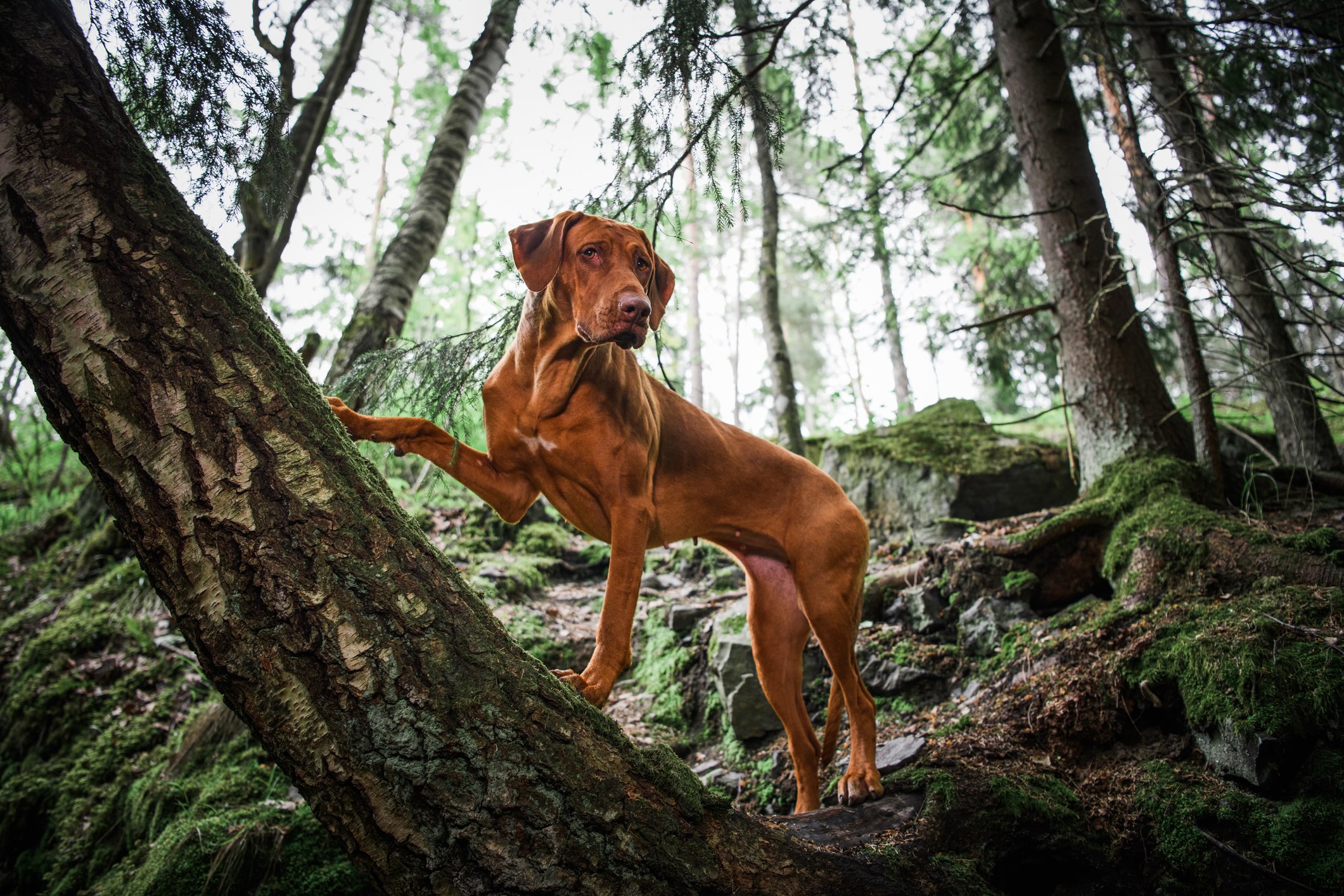
Rhodesian Ridgeback dogs can be an ideal pet for many families. Ridgebacks are loyal, affectionate, and—when properly trained and socialized—they can coexist peacefully with other dogs and children.
As with any breed, it is important to do your homework before bringing a Rhodesian Ridgeback puppy home. Researching, visiting, and interviewing breeders is a great way to get to know the breed. Likewise, attending agility trials or obedience events can give you a firsthand view of how the breed works and interacts with humans.
The ideal home for a Rhodesian Ridgeback provides the pup with lots of space to run and offers plenty of time for mental and physical stimulation. Pet parents who can engage their dog in obedience, agility, hunting, and other sporting events can satisfy this requirement, but the breed can also do well with a daily walk or jog followed by a game of fetch.
Ridgebacks are versatile but do require a significant amount of time, energy, and commitment.
Rhodesian Ridgeback FAQs
Is a Rhodesian Ridgeback a good family dog?
Yes. If properly trained and socialized, the Rhodesian Ridgeback can be a wonderful family companion.
Are Rhodesian Ridgebacks smart dogs?
Rhodesian Ridgebacks are very smart dogs that require daily mental stimulation to keep them from becoming bored.
How much does a Rhodesian Ridgeback cost?
The average Rhodesian Ridgeback price varies by location and breeder. The best way to determine the general cost for a Ridgeback is to start talking to breeders and pet parents at shows or events.
Rhodesian Ridgeback rescues may be an alternative that costs less.
What is the Rhodesian Ridgeback known for?
The Rhodesian Ridgeback is known as an all-purpose hound with a ridge of fur growing backward down the center of the back.
